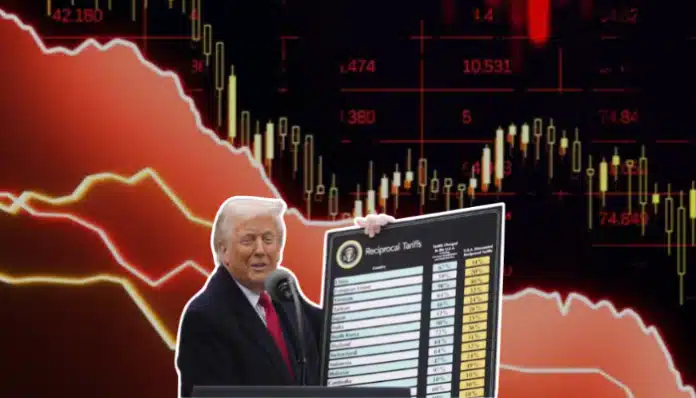Global Market Turmoil: Trump’s Tariffs Trigger Economic Shockwaves

As global markets reel from the impact of U.S. President Donald Trump’s recent tariff announcements, investors are bracing for a turbulent economic landscape. The imposition of reciprocal tariffs has sparked fears of a trade war, particularly with China, which has retaliated with significant tariffs of its own. This escalating situation has led to sharp declines in stock markets worldwide, including a notable crash in Indian markets, prompting concerns about a potential recession.
Global Markets in Freefall
The ripple effects of Trump’s trade policies have been felt across Asia, with financial markets experiencing severe declines. Following a significant drop on Wall Street, Asian markets opened to alarming losses. The Nikkei 225 index in Japan plummeted nearly 8% at the start of trading, stabilizing at a 6% decrease by midday. Other markets were not spared; Hong Kong’s Hang Seng index fell by 9.4%, while the Shanghai Composite and South Korea’s Kospi dropped by 6.2% and 4.1%, respectively.
In India, the BSE Sensex and Nifty50 indices suffered a crash of around 5% on Monday, although they managed a recovery in the final hour of trading. The day’s sell-off resulted in a staggering loss of Rs 14.2 lakh crore in market capitalization, marking one of the worst single-day declines in Indian stock market history. Analysts attribute this downturn to the widespread weakness in global markets, which has significantly shaken investor confidence.
Investor Sentiment and Market Reactions
Market analysts are urging caution as the unprecedented decline continues to unfold. Rajesh Bhosale, a technical analyst at Angel One, noted that any signs of stabilization in global markets could trigger a robust recovery in Indian stocks, restoring investor optimism. However, the current climate has led many investors to adopt a more cautious approach, particularly those with significant exposure to the U.S. market.
The impact of the tariffs has been particularly pronounced on companies with substantial business interests in the U.S. The Tata Group, for instance, has seen its market value drop by approximately Rs 2.4 lakh crore since the tariff announcements, while Reliance Industries has lost around Rs 1.3 lakh crore. This trend reflects broader concerns about a potential recession in the U.S. and its implications for global economic stability.
Foreign Investment Withdrawals
The market turmoil has prompted a significant withdrawal of foreign investment from Indian equity markets. On Monday alone, foreign institutional investors offloaded shares worth Rs 9,040 crore (approximately $1.04 billion), marking one of the largest divestments this year. In contrast, domestic institutional investors displayed confidence, making net purchases totaling Rs 12,122 crore. This divergence highlights the contrasting perspectives of local and foreign investors amid the ongoing economic uncertainty.
Experts warn that the trade war initiated by Trump’s tariffs could lead to inflation and a global economic slowdown. Major investment banks, including JP Morgan and Goldman Sachs, have raised the likelihood of a recession in the U.S., further fueling concerns about the global economy. Larry Fink, CEO of BlackRock, echoed these sentiments, stating that many CEOs believe the U.S. has entered a recession, predicting further downturns in equity markets.
India’s Economic Resilience Amidst Global Uncertainty
Despite the turmoil, some analysts maintain a positive outlook for the Indian economy. They argue that India’s relatively small share in global trade may limit the impact of these developments. Narendra Solanki from Anand Rathi Shares expressed optimism, maintaining a 12-month target of 26,000 for the Nifty50 index. He believes that while short-term disturbances may affect investor confidence, they are unlikely to derail India’s fundamental growth trajectory.
A Balasubramanian, MD & CEO of Aditya Birla Mutual Fund, emphasized India’s strong domestic fundamentals and minimal direct impact from tariff changes. He noted that falling oil prices could help reduce inflation, potentially leading to rate cuts that would support growth. As policymakers work to implement stabilizing measures, India’s robust economic framework positions it to weather the storm of global disruptions.
Observer Voice is the one stop site for National, International news, Sports, Editor’s Choice, Art/culture contents, Quotes and much more. We also cover historical contents. Historical contents includes World History, Indian History, and what happened today. The website also covers Entertainment across the India and World.
Follow Us on Twitter, Instagram, Facebook, & LinkedIn

